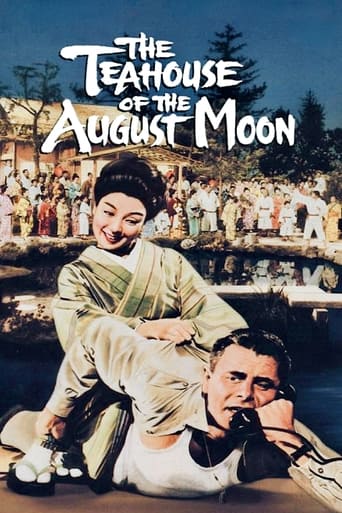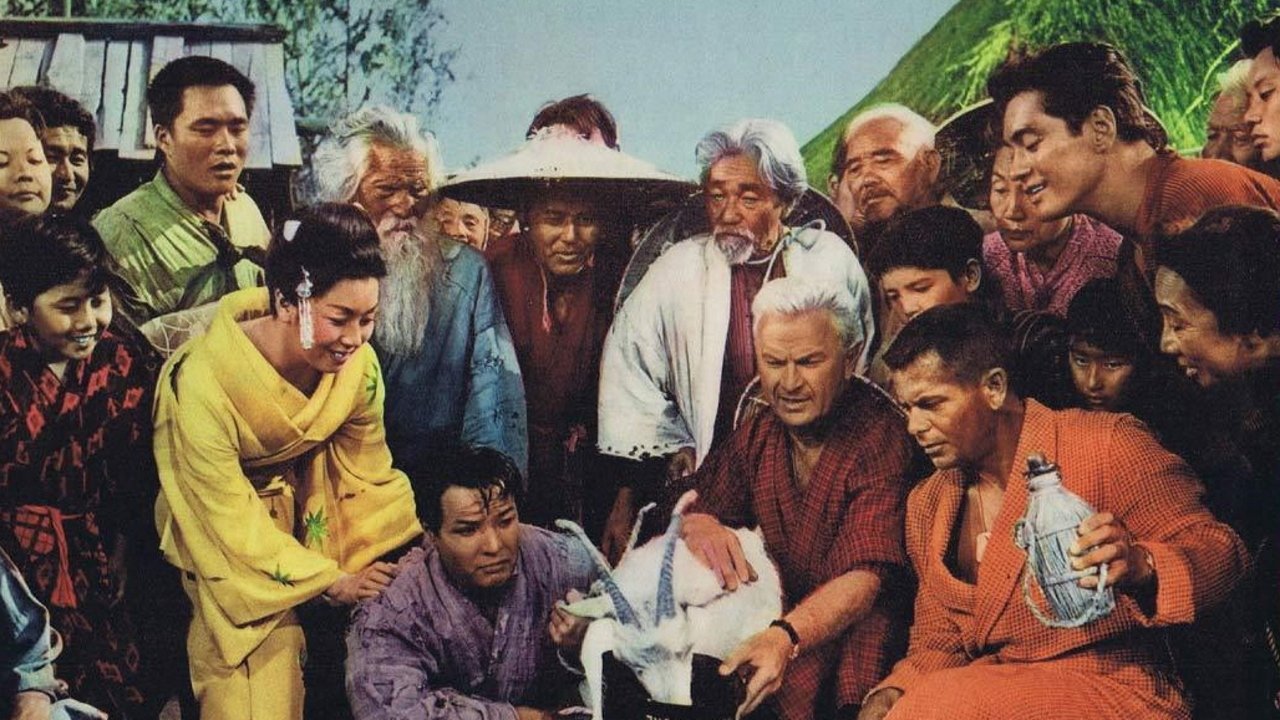PimpinAinttEasy
Dear Marlon Brando,you were an unusual casting choice for the role of Sakini, a sort of a Japanese man Friday to occupying American forces looking to spread democracy across Japan. You looked like you were having fun and for once I could understand exactly what you were saying as you were not mumbling. I would love to hear the story behind your casting as a Japanese villager.The film is a farcical and feel good social satire about American attempts to spread their values and way of life in the village of Tobiki, Okinawa after World War 2. Glenn Ford is the good hearted solider who is trying to impart the merits of democracy to the unsuspecting villagers with the help of Sakini. But things do not go according to plan and Ford's character ends up falling in love with the village and even helps them set up a brewery. A light-hearted study of American follies ..... I mean foreign policy and attitudes towards the natives, the film has some great one liners and some of the scenes are truly hilarious. It is worth the price of admission for your comedic role as a Japanese villager, Marlon. Paul Ford turns in a great performance as the hawkish Col. Wainwright Purdy III.Best Regards, Pimpin.(6/10)
cmeneken-1
This is an excellent film on many levels, but one overlooked aspect is the role of the organic health food addict/Army shrink and performance by Eddie Albert. Albert had an unusual background and career, but his environmental commitment (and that of his son Edward)was quite impressive. It seems he was one of the first active celebrity environmentalists, and perhaps more than that, if this role is any indication. As far as I know, this is the first time Hollywood ever presented--let alone mentioned--a major character who was into organic foods, i.e., into the environment on a higher level. And it turns out that the actor was that way in real life, so perhaps it may have impacted on the part. In any event, I don't know if there has been a film role since then pushing the organic food message, and in such a delightful way. Moreover, it gave Albert a chance, rare as it was, to demonstrate his considerable comic talents, along with the rest of the gang.
bkoganbing
The Okinawans and for that matter the rest of the Ryukyu Island chain have seen it all before as Sakino remarks to Captain Fisby when he arrives at his assigned village to give them the conquering hero speech. Actually author John Patrick of The Teahouse of the August Moon knew what he was talking about. Over their history these people due to geography have been taken over time and again by the Chinese and Japanese going back and forth. Maybe American skin color was paler and the eyes didn't slant, but to the Okinawans it's just another occupier.That particular island cost plenty in the last great battle of the Pacific in World War II. The Japanese at this point considered the Ryukyus their homeland and fought dear for it. In part it led to the decision to use those atomic bombs to bring the war to a conclusion.The Teahouse of the August Moon was one of the biggest successes of the Broadway theater in the Fifties. It ran for 1053 performances from 1953 and 1955. It received the Tony Award for Best Play, Best Actor for David Wayne as Sakino, Best Writer for author John Patrick and a Pulitzer Prize for drama. Leads David Wayne and John Forsythe were dropped from the film version as MGM wanted film names and they signed Marlon Brando as Sakino and Glenn Ford as Captain Fisby. Both performed ably in their roles and rumor has it didn't get along. From Brando's point of view that might have been partly due to Louis Calhern's death on the set. Calhern and Brando apparently became close on the set and when Calhern died it unnerved Brando. It did allow the Paul Ford who had originated the role of Colonel Purdy on Broadway to repeat it for the screen and for the sake of the film I can't see how Calhern would have been better.To say that the occupation of Japan went a whole lot better than what's going on now in Iraq is an understatement. Of course it helped no end to have the Emperor telling his people not to resist. It also helped to have Douglas MacArthur in charge who spent his formative years in the Far East and knew the Orient well.Not everyone under MacArthur's command had his sensibilities and Paul Ford was one of those officers. He had a manual which as he so eloquently put it saves you the trouble of thinking. The problem Ford has is when Glenn Ford is assigned to his command. He's an officer who's had a problem adjusting to the army because he does think too much. But in occupation duty it serves him well as it turns out.Ford with Okinawan interpreter Marlon Brando is assigned to a small village where he throws away the plan because the villagers very democratically decide they have their own ideas. One of them is to build a teahouse for the geishas.It would take a lot of time and words to describe the importance in their culture of the teahouse. It's not merely a bordello and the geishas have a function that's not just sexual. Suffice it to say that Ford recognizes this and instead of a schoolhouse as per the manual, allows the Okinawans to build a teahouse.Marlon Brando's role functions in the play and also as a Greek chorus narrator. He did a good job, but in these days of political correctness his performance is now damned by political correctness. And irony of ironies he lived long enough to see it.Where does respect for tradition start and end? The British trampled on a lot of Indian traditions in their occupation. They also helped do away with a lot of barbarous practices like the strangling cults of thugee and that lovely custom of suttee where the widow is supposed to allow herself to be cremated live beside her dead husband. I'd say that was one positive result of their occupation. Certainly in Iraq and Afghanistan there are things in fundamentalist Moslem culture that are an abomination. But how to change it. Not apparently as we're going.The Teahouse of the August Moon is both entertaining and thought provoking and might have a timely message for today.
moonspinner55
Adaptation of John Patrick's play about American soldier trying to teach Democracy to the Japanese in 1946 Okinawa. One-joke material about cultural assimilation isn't exactly politically-correct when seen today, but were these stale, frantic jokes ever amusing? Marlon Brando's performance as an Oriental interpreter has to be seen to be believed; he's lively, yes, but there's a concerted effort to make him appear clownish (this couldn't have been Brando winging it--director Daniel Mann must assume part of the blame). This silly story never gains any momentum, and the slapstick hijinks are broad but stilted (they have a mechanical feel which, again, should be attributed to the direction). Glenn Ford, Paul Ford and Eddie Albert are solid as always, but they get swallowed up in this unfunny facade. *1/2 from ****


 AD
AD



